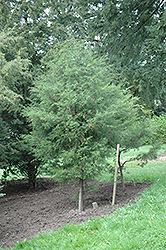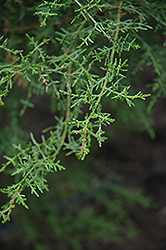It's all about ...
plants

Mendocino Cypress
Cupressus goveniana 'var. pygmaea'
Height: 35 feet
Spread: 15 feet
Sunlight:
![]()
Hardiness Zone: 8a
Description:
A columnar accent tree, with a more conical head; foliage is scale sprays that are dark green; use as a solitary accent in the yard or a large garden; may also be maintained as a shrub
Ornamental Features
Mendocino Cypress is primarily valued in the landscape for its rigidly columnar form. It has attractive dark green evergreen foliage. The scale-like sprays of foliage are highly ornamental and remain dark green throughout the winter.
Landscape Attributes
Mendocino Cypress is a dense evergreen tree with a strong central leader and a narrowly upright and columnar growth habit. It lends an extremely fine and delicate texture to the landscape composition which can make it a great accent feature on this basis alone.
This is a relatively low maintenance tree, and should not require much pruning, except when necessary, such as to remove dieback. Deer don't particularly care for this plant and will usually leave it alone in favor of tastier treats. It has no significant negative characteristics.
Mendocino Cypress is recommended for the following landscape applications;
- Accent
- Vertical Accent
Planting & Growing
Mendocino Cypress will grow to be about 35 feet tall at maturity, with a spread of 15 feet. It has a low canopy with a typical clearance of 1 foot from the ground, and should not be planted underneath power lines. It grows at a fast rate, and under ideal conditions can be expected to live to a ripe old age of 100 years or more; think of this as a heritage tree for future generations!
This tree should only be grown in full sunlight. It prefers dry to average moisture levels with very well-drained soil, and will often die in standing water. It is considered to be drought-tolerant, and thus makes an ideal choice for xeriscaping or the moisture-conserving landscape. It is not particular as to soil pH, but grows best in sandy soils. It is somewhat tolerant of urban pollution. This is a selection of a native North American species.
This plant is not reliably hardy in our region, and certain restrictions may apply; contact the store for more information.

